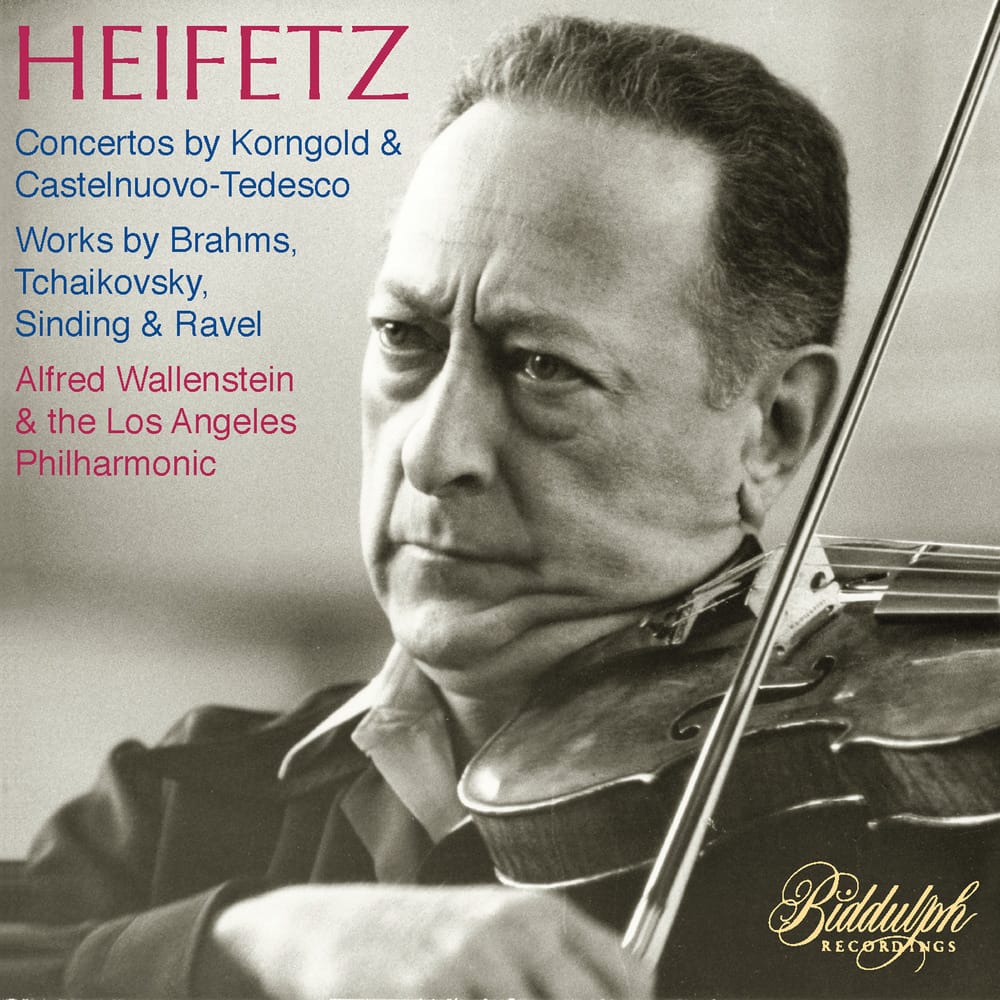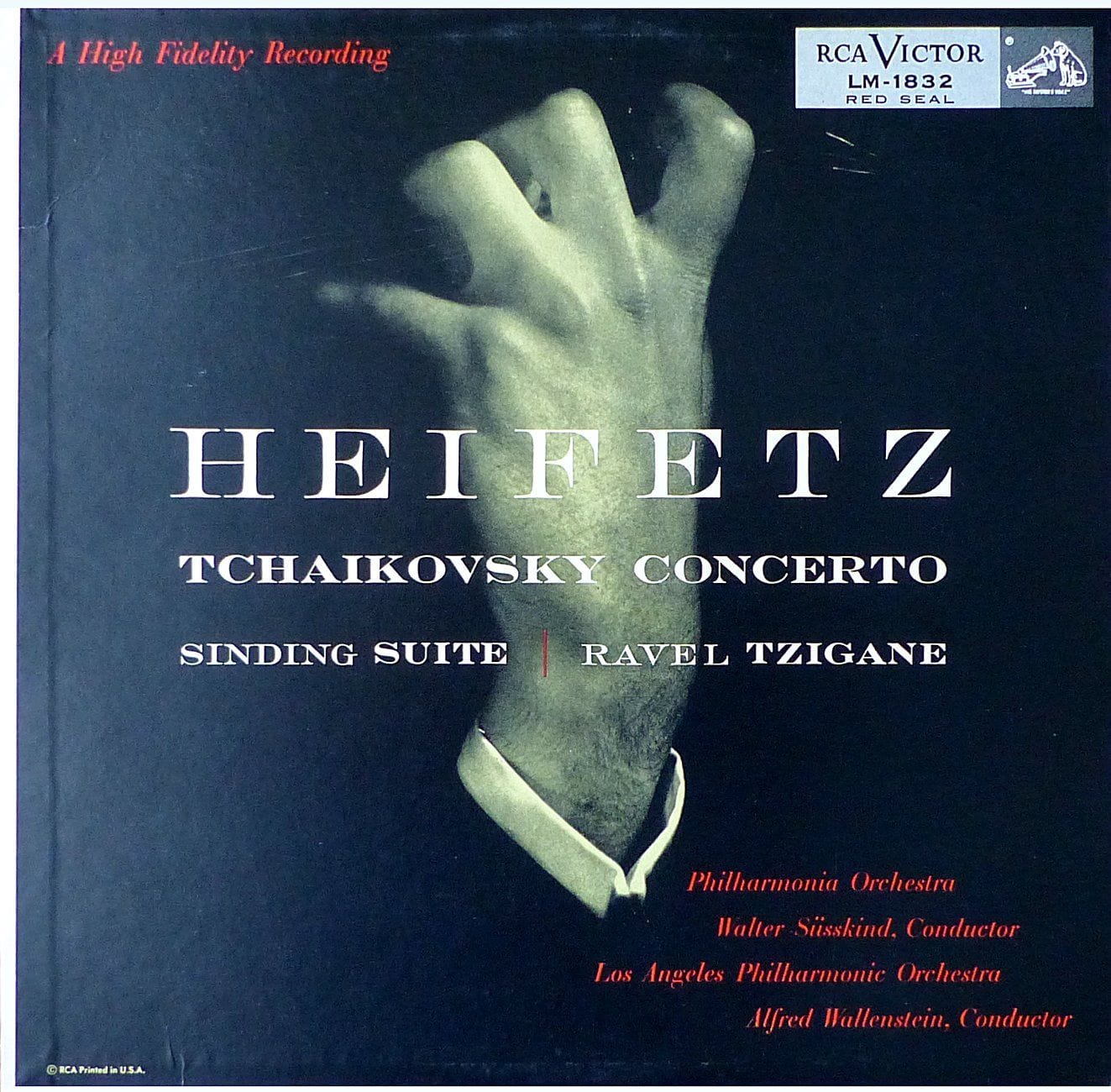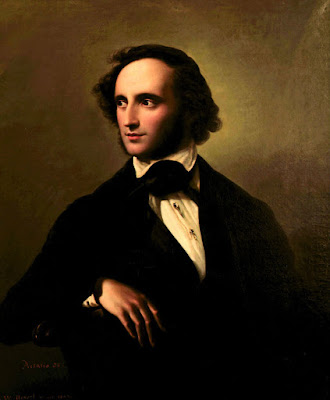
After yesterday’s post (Klassik unterim Hakenkreutz), this classic performance of Korngold seems relevant. Erich Wolfgang Korngold (1897-1957) left Europe in the volatile mid-1930s and found fame in the US, specifically Hollywood (a fascinating upcoming disc on Centaur, Emigrés and Exiles in Hollywood, considers just this phenomenon, coupling Korngold with Schoenberg, Tansman, Eisler, Miklos Rósza and others).
The Korngold Violin Concero is a masterpiece, but it is one that needs great performances to be appreciated as such. Heifetz fits the bill nicely: with Heifetz and Wallenstein (who is clearly on the same page) we hear an almost Schoenbegian pining to the upwardly-moving motif of the first movement. The second movement sings bu is not saccharine and includes the most remarkable flights of fantasy for Heifetz. This is a Romance, and we are in Hollywood. And yet Korngold brings real expressivity and profundity in the right hands – and here, those are Heifetz’s. The finale is an absolute masterclass in virtuosity against the ever-so-jolly contribution of the Los Angeles orchestra,
The Concerto itself was suggested to Korngold by Bronisław Hubermann, and is dedicated to Alma Mahler. It was Heifetz that premiered the work in 1947, though and who championed the work diligently.
This is Heifetz in his absolute prime. I have included the following YouTube but suggest you investigate the Biddulph transfer, as it is superb. The YouTube does however reproduce the original RCA Victor LP sleeve (LM 1782):
This performance has been released on a number of labels previously, including Naxos Historical (coupled with Waxman and Conus) and RCA itself in compact disc format (both on Gold Seal coupled with Rösza and Waxman). There’s even n early pressing going for £64.10 on Amazon!
If you know anything by the Norwegian composer Christian August Sinding (1856-1941) at all, it is likely to be Frühlingsrauschen, Op. 32/3 (usually translated as “Rustle of Spring”). For sentimental reasons on my part, I have picked Joseph Coooper’s performance, which I knew from an old LP, one of the many volumes of Your 100 Best Tunes (!)
Fascinatingly, the cadenza in the finale (Tempo giusto) of the piece played by Heifetz seems to walk into a Bach Solo Sonata. The clue is in the name, of course: Suite Im alten Still (1888, Finding’s first published violin composition). Listen to Heifetz’s frenzied spiccato in the opening Presto (and it really is a Presto). The archaic cadence at the end plugs in well to the overall intent, too:
The Adagio is full of silken melodies, followed by the finale referenced above:
The Sinding was released on LM 1832, as one of the couplings to Heifetz’ Tchaikovsky Concerto recording:

A Hungarian Dance by Brahms is given with superhuman flair (i’s the Joachim arrangement) before Tchaikovsky’s Sérénade mélancolique, a piece written immediately after the composer’s First Piano Concerto. It is this Tchaikovsky thet is really special, perfectly aligned with Tchaikovsky’s musical vocabulary:
The Biddulph transfer is superb – everything is perfectly audible. Use the YouTubes as a guide, but do try to hear the featured release.
Heifetz makes a fine case for Tzigane (I confess it is not my favourite piece of music!). He makes an even finer one for Castelnuovo-Tedesco’s Violin Concerto No. 2, ‘I Profeti’ (The Prohoets). Castelnuovo-Tedesco studied with Pizzetti. An Italian composer of jewish descendants, he also left Europe at the onset of the war, eventually settling in Hollywood: he taught, amongst other, Nelson Riddle, Henry Mancini, André Previn, and John Williams. The Second Violin Concerto was premiered by Heifetz, there with the New York Philharmonic and Toscanini.
The three movements each centre on a prophet each: Isaiah, Jeremiah, and Elijah. The first movement soo cadenza includes a part for harp. The music is impassioned and fluid; the harp rturns in the second movement (Espressvo e dolente). The finale scampers but there are some beautiful twists to more interior places. Here’s the complete concerto:
This Biddulph disc showcases Jascha Heifetz at the very height of his powers. Recommended.










